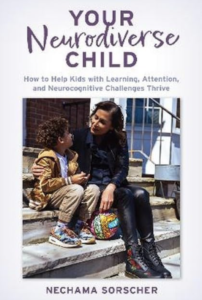Holiday Survival Guide: A Child Psychologist’s Proven Tips for Managing Seasonal Stress by Dr. Nechama Sorscher, PhD, a clinical psychologist in New York City
 The holidays are a unique time of year that has its own joys and stressors for all families. However, sadly for parents and specifically for parents of neurodivergent children, the holidays are often a source of nail biting anxiety. Will my child have a major melt down at the Thanksgiving table? Will I be able to enjoy the long anticipated trip to the Caribbean or will my “bratty” child ruin the trip for everyone? How can I schedule all the Christmas activities I love to do when my child is such as spoil sport? Uncle Harry loves to pinch my child’s cheeks. How do I stop that without coming across rude? Understanding why your child reacts the way that they do is the first step in constructing an amazing plan that ensures that everyone enjoys the holidays!
The holidays are a unique time of year that has its own joys and stressors for all families. However, sadly for parents and specifically for parents of neurodivergent children, the holidays are often a source of nail biting anxiety. Will my child have a major melt down at the Thanksgiving table? Will I be able to enjoy the long anticipated trip to the Caribbean or will my “bratty” child ruin the trip for everyone? How can I schedule all the Christmas activities I love to do when my child is such as spoil sport? Uncle Harry loves to pinch my child’s cheeks. How do I stop that without coming across rude? Understanding why your child reacts the way that they do is the first step in constructing an amazing plan that ensures that everyone enjoys the holidays!
All children and Neurodivergent children in particular are extremely committed to routines and schedules. Their brains have real difficulty shifting gears. You can think about it as a record that gets stuck in the groove and just plays the same song over and over again. That is what happens in their brain. To help them shift gears comfortably, we can build on their strengths.
As a child psychologist with over three decades of experience, here are some tried and true strategies I share with my patients to help make the holidays less stressful:
Make the plan, share the plan, execute the plan!
All children love details and familiarity, this is especially true for neurodivergent children so reviewing with them every day what the plan is will be extremely helpful to them. Creating a calendar and reviewing the schedule for each day in writing will help them prepare mentally for the events. Giving them choices and incorporating those choices in the activity is essential. The choice can be minor as what color do you want the gift wrap paper? Or more significant such as where do you want to go for a day trip? Also remember, “Less is more” Plan fewer activities for maximum success. Give your child lots of time to rest and recharge in a calm, quiet environment.
Avoid Sensory Overload
Neurodivergent children experience stimuli as either more intense or less intense; some children are hyper sensitive and feel extra loud noise is awesome, some are hypo sensitive and don’t register pain. When children are super sensitive to their environment, noise, light, taste and smell can become extremely overloading and physically uncomfortable for them. Think of it as having an allergy to unfamiliar tastes, smells, noises and people. Through that lens it’s easy to see that the Thanksgiving table can be a super uncomfortable space! What to do? Treat it like an allergy. Encourage your child to remove themselves from the table when they are feeling overwhelmed. Bring their own food and entertainment so they can be comfortable. Explain to your family why you are taking these steps and ask for support. That is a set up for success.
Travel Slow and Avoid Transitions When Possible
Holiday travel can be exhausting and overwhelming for everyone, especially for children with neurocognitive challenges. Air travel involves multiple transitions that can put your child on overload. If you can, travel by car instead. Stock up on snacks and entertainment such as books and games. Make a cozy nest in the back with blankets. Prepare to stop often and go at a relaxed pace to make the journey part of the fun.
If you must travel by air, review with your child the different places you will be. Make a preparatory trip to the airport to show your child what it looks like and explain the schedule. If you can visit an airplane that would help your child acclimate. On the day of the flight, get there early, give your child a checklist of all the activities and some noise reducing headphones. If your child gets stressed, take the time to be calm and reassuring; remind them of the schedule and help them take deep breaths.
Keep Calm & Carry Favorites
Work with your child to create a calming experience and have them pick their favorite stuffed animal, blanket or fidget toy. Set up reasonable expectations and communicate them to family members. For example, your child experiences physical contact as aversive so let all family members know that there is no hugging, cheek pinching etc. Ask your child what their preferred mode of greeting is. Do you want to give a high five? Fist bump? Smile? Practice this greeting ahead of time and give your child positive feedback about his choice!
Creating a sensory rich experience for your child is essential for their nervous system to calm down. Remember you are overloading their circuits by exposing them to new, unfamiliar stimuli that they perceive as assaultive. For them it truly is too loud, too smelly, too spicy!
Keep in mind that this is super stressful and overloading for your child; they are not giving you a “hard time,” but they are having a “hard time.” When we understand the reason for the behavior lies in the neural circuitry of the brain, it is much easier to be sympathetic and take the actions that will reassure your child.
Here’s to a merry and bright holiday season filled with joy and less meltdowns!
 ABOUT DR. SORSCHER
ABOUT DR. SORSCHER
Dr. Sorscher has over three decades of experience working with patients with neurocognitive challenges, both as an evaluator and a psychodynamic therapist. Dr. Sorscher has a PhD in clinical psychology from Adelphi University and a certificate in psychoanalysis and psychotherapy from NYU’s Postdoctoral Program of Psychotherapy and Psychoanalysis. She has published many articles in academic journals and has two new books including Assessment and Intervention with Children, Adolescents, and Adults with Neurocognitive Challenges: A Psychodynamic Perspective available now published by Littlefield, Roman, which delineates how to best work with neurodiverse children and Your Neurodiverse Child: How to Help Kids with Learning, Attention, and Neurocognitive Challenges Thrive for parents and persons with Autisim, available for presale on Amazon, releasing April 1st, 2025.















